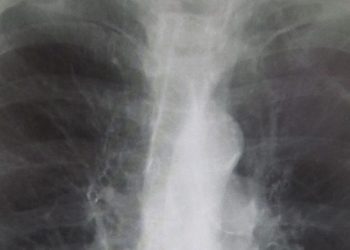Genomic sequencing identifies variants linked to congenital diarrhea and enteropathies
1. In this cross-sectional study, nearly half of the infants with congenital diarrhea and enteropathies (CODEs) had identifiable causal variants, most commonly in genes involved in epithelial cell trafficking and polarity.
2. A novel causal variant in NEUROG3, a gene critical for enteroendocrine cell development, was identified in infants with CODEs.
Evidence Rating Level: 2 (Good)
Study Rundown: CODEs are a collection of disorders associated with significant morbidity and mortality consequent to ongoing malnutrition and dehydration. Currently, there is no definitive treatment; instead, medical management focuses on supportive care. However, identifying genetic variants underlying CODEs has shown promise for targeted management strategies. This current multicenter investigation analyzed the genomes of infants with CODEs to systematically identify genetic variants responsible for the disorders. Causal variants were found in nearly half of all the infants analyzed, with most disorders being autosomal recessive and a few X-linked. Notably, half of the identified variants affected genes involved in epithelial trafficking and polarity, including EPCAM, MYO5B, TTC7A, and SKIV2L. In addition, a novel variant was identified in NEUROG3, which plays a role in enteroendocrine cell development. Further functional analysis in zebrafish and cell models implicated three other candidate genes (GRWD1, MYO1A, and MON1A) in CODEs, demonstrating their impact on intestinal pathways. However, this study was limited by the potential for undetected variants through exome sequencing and the possibility that patients with CODEs may harbour rare or private mutations. Despite these limitations, the findings highlight the value of genetic sequencing in elucidating the molecular basis of CODEs and guiding future targeted therapies.
Click here to read the study in NEJM
In-Depth [cross-sectional study]: This cross-sectional study aimed to identify genetic variants associated with the pathogenesis of CODEs. Infants diagnosed with chronic diarrhea lasting more than two weeks without an anatomic, infectious, or allergic cause were eligible for inclusion. The study sequenced the genomes of 139 infants with CODEs and 182 family members without CODEs. A total of 62 (48%) of the 129 probands had an identifiable genetic variant in one of 24 established genes linked to CODEs. Of these, the vast majority (94%) had autosomal recessive diseases, while only 6% of the infants were found to have X-linked conditions. Notably, 27 of the 62 probands (43.5%) had variants in genes related to epithelial cell trafficking and polarity (EPCAM, MYO5B, TTC7A, and SKIV2L). Additional variants were identified in genes associated with nutrient and electrolyte transport (SLC9A3), nutrient metabolism (DGAT1), and immune-cell regulation (XIAP). A novel causal variant in NEUROG3, a gene linked to enteroendocrine cell development, was discovered in three cases. Functional studies using zebrafish and cell models revealed the significance of variants in GRWD1, MYO1A, and MON1A, which are related to ribosomal biogenesis, microvilli localization, and endosomal sorting, respectively. Variants in GRWD1 altered gut morphology in zebrafish, significantly increasing goblet cell coverage. Additionally, in HeLa cells, the H307R and V368F variants of GRWD1 both showed a significantly higher cytosol-to-nucleus ratio compared to the wild type (p<0.001). Regarding MYO1A, the D240N and I678F variants significantly impaired proper microvilli localization compared to wild type (p<0.001). Finally, knockout of MON1A significantly increased mucin thickness in zebrafish (p<0.001), while the MON1A variant R249C caused impairments in both endosome localization and maturation in the gut. Overall, this study clarifies the genetic underpinnings of CODEs.
Image: PD
©2025 2 Minute Medicine, Inc. All rights reserved. No works may be reproduced without expressed written consent from 2 Minute Medicine, Inc. Inquire about licensing here. No article should be construed as medical advice and is not intended as such by the authors or by 2 Minute Medicine, Inc.






